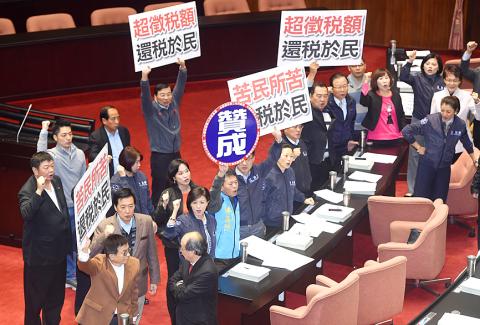The Chinese Nationalist Party (KMT) has prepared close to 4,000 motions to slash or freeze the general budget for next year that the Democratic Progressive Party (DPP) hopes to pass during the extraordinary session starting next week, KMT caucus convener Sufin Siluko (廖國棟) said yesterday.
The second legislative plenary session started its recess yesterday, with lawmakers scheduled to meet from Wednesday to Jan. 26 for an extraordinary session.
The state-run enterprises’ budget proposal for this year, the review of which had been obstructed by the KMT submitting more than a 1,000 motions for changes since the last legislative plenary session, finally cleared the floor yesterday.

Photo: Liao Chen-huei, Taipei Times
However, the general budget proposals for next year are still in limbo, with Sufin yesterday claiming to have prepared about 4,000 motions to slash and freeze funding.
These motions will surely be put to vote and drag out the meeting, which is what the KMT caucus wants, the convener said, urging the DPP caucus to engage in negotiations.
Other than the budget proposals for state-run enterprises, the legislature also cleared several amendment bills yesterday.
Amendments were made to the Act for the Development of Biotech and New Pharmaceuticals Industry (生技新藥產業發展條例) to relax the definition of applications for “high-risk medical devices” and add “biotech and new pharmaceutical products” as a new category.
The Patent Act (專利法) was amended so that those who apply for an invention patent now are allowed an application period of 12 months after disclosure. The restrictions on how the disclosure are made have been scrapped.
Amendments to the Waste Disposal Act (廢棄物清理法) were made to increase penalties for violations of the act. Those charged with illegally disposing of waste resulting in death can be sentenced to seven years to life imprisonment, with the fine also increasing from no more than NT$30 million (US$929,397) to NT$15 million. Fines for waste disposal resulting in serious injuries were also increased from NT$9 million to NT$25 million, in addition to three to 10 years’ imprisonment.
Prison terms for disposing of waste that leads to human endangerment were increased from one year to between five years and seven years, and the fine raised from NT$6 million at NT$20 million.
The amended act also states that waste incinerators in each city and county should prioritize the municipality’s general waste rather than industrial waste.
The amendment bill to the Special Service Act (特種勤務條例) was cleared to provide medical care and nursing care if special service personnel suffers serious injuries resulting in permanent disability while on duty.
The amendment to the Tax Collection Act (稅捐稽徵法) to extend the tax collection period for taxpayers who owe more than NT$10 million in taxes by five years, thereby pushing the deadline to March 4, 2022, also passed its third reading.

Alain Robert, known as the "French Spider-Man," praised Alex Honnold as exceptionally well-prepared after the US climber completed a free solo ascent of Taipei 101 yesterday. Robert said Honnold's ascent of the 508m-tall skyscraper in just more than one-and-a-half hours without using safety ropes or equipment was a remarkable achievement. "This is my life," he said in an interview conducted in French, adding that he liked the feeling of being "on the edge of danger." The 63-year-old Frenchman climbed Taipei 101 using ropes in December 2004, taking about four hours to reach the top. On a one-to-10 scale of difficulty, Robert said Taipei 101

A preclearance service to facilitate entry for people traveling to select airports in Japan would be available from Thursday next week to Feb. 25 at Taiwan Taoyuan International Airport, Taoyuan International Airport Corp (TIAC) said on Tuesday. The service was first made available to Taiwanese travelers throughout the winter vacation of 2024 and during the Lunar New Year holiday. In addition to flights to the Japanese cities of Hakodate, Asahikawa, Akita, Sendai, Niigata, Okayama, Takamatsu, Kumamoto and Kagoshima, the service would be available to travelers to Kobe and Oita. The service can be accessed by passengers of 15 flight routes operated by

Taiwanese and US defense groups are collaborating to introduce deployable, semi-autonomous manufacturing systems for drones and components in a boost to the nation’s supply chain resilience. Taiwan’s G-Tech Optroelectronics Corp subsidiary GTOC and the US’ Aerkomm Inc on Friday announced an agreement with fellow US-based Firestorm Lab to adopt the latter’s xCell, a technology featuring 3D printers fitted in 6.1m container units. The systems enable aerial platforms and parts to be produced in high volumes from dispersed nodes capable of rapid redeployment, to minimize the risk of enemy strikes and to meet field requirements, they said. Firestorm chief technology officer Ian Muceus said

MORE FALL: An investigation into one of Xi’s key cronies, part of a broader ‘anti-corruption’ drive, indicates that he might have a deep distrust in the military, an expert said China’s latest military purge underscores systemic risks in its shift from collective leadership to sole rule under Chinese President Xi Jinping (習近平), and could disrupt its chain of command and military capabilities, a national security official said yesterday. If decisionmaking within the Chinese Communist Party has become “irrational” under one-man rule, the Taiwan Strait and the regional situation must be approached with extreme caution, given unforeseen risks, they added. The anonymous official made the remarks as China’s Central Military Commission Vice Chairman Zhang Youxia (張又俠) and Joint Staff Department Chief of Staff Liu Zhenli (劉振立) were reportedly being investigated for suspected “serious